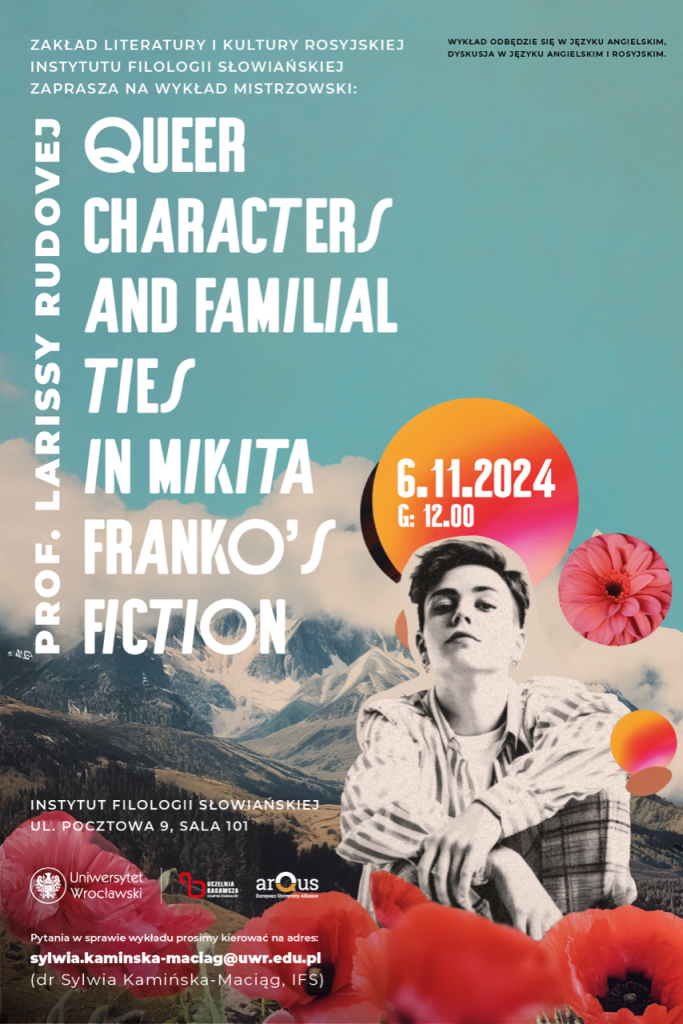
Wykład mistrzowski prof. Larissy Rudovej pt. „Queer Characters and Familial Ties in Mikita Franko’s Fiction”
Wykład odbędzie się w języku angielskim, dyskusja w języku angielskim i rosyjskim.
Streszczenie w języku angielskim: By the beginning of the twenty-first century, new themes emerged in Russian children’s and young adult (YA) literature. Among them, gender has become a prominent, albeit controversial, topic for readers, literary critics, and educators. Openly queer writing has been at odds with the rapidly changing cultural and political climate, especially after Putin’s 2013 law on gay propaganda, its tightening in 2023, and the government’s strong emphasis on the protection of traditional family values. In this political atmosphere, the topic of childhood queerness or nontraditional families has hardly been addressed in any public venue, and it remains a blind spot of Russian literary criticism and scholarship. This presentation is an attempt to start a discussion about queer YA literature written by Russian authors who sympathize, empathize, or identify with queer youths.
After a brief overview of Russian children’s and YA literature with queer characters, I will focus on the work of Mikita Franko (b. 1997), a young Kazakhstani writer who, in his seven novels to date, chronicles the lives of teenage and adult queer characters. At the center of his plots is the notion of home, which can turn from a place of nurturing, understanding, and love into a territory of alienation, suffering, and even death in different family units. Franko’s fiction interrogates sociocultural attitudes toward gender and sexuality in Russia and brings under scrutiny the institution of the nuclear family based on traditional family values.
Streszczenie w języku rosyjskim: К началу XXI века в русской детской и юношеской литературе появились новые темы. Среди них гендер стал заметной, хотя и противоречивой темой для читателей, литературных критиков и педагогов. Тем не менее квир-литература оказалась в противоречии с быстро меняющимся культурным и политическим климатом, особенно после принятия в 2013 году закона о гей-пропаганде, его ужесточения в 2023 году и акцентирования внимания российского правительства на защите традиционных семейных ценностей. В этой политической атмосфере тема детей и подростков-квиров и нетрадиционных семей практически не поднималась на публичных площадках и остается «слепым пятном» российской литературной критики и литературоведения. Эта презентация – попытка начать дискуссию о квир-литературе для детей и подростков в России.
После краткого обзора российской детской и юношеской литературы с персонажами-квирами я сосредоточусь на творчестве Микиты Франко (р. 1997), молодого казахстанского писателя, который в своих романах ведет хронику жизни подростков и взрослых персонажей-квиров. В центре его сюжетов – понятие дома, который в одних семьях может быть местом понимания и любви, а в других становится территорией отчуждения, страданий и даже смерти. В своих книгах Франко подвергает тщательному анализу институт нуклеарной семьи, основанный на традиционных семейных ценностях.
Dr. Larissa Rudova is Yale B. and Lucille D. Griffith Professor in Modern Languages and Professor of German and Russian at Pomona College. She is the author of two monographs, Pasternak’s Short Fiction and the Cultural Vanguard (1995) and Understanding Boris Pasternak (1997). She has co-edited Russian Children’s Literature and Culture (2008, 2010), Historical and Cultural Transformations of Russian Childhood. Myths and Realities (2023) and several thematic journal clusters on children’s and YA literature and culture. Rudova is a co-founder of the international research group, ChEEER (Childhood in Eastern Europe, Eurasia, and Russia), affiliated with ASEEES. Her numerous articles have been published in American, Canadian, European, and Russian journals and scholarly volumes. Her research interests include contemporary Russian popular culture and literature, children’s and YA literature, representations of childhood, East European and Russian cinema, and gender studies.
Organizacja wykładu: dr Sylwia Kamińska-Maciąg, dr hab. Elżbieta Tyszkowska-Kasprzak, prof. UWr, Instytut Filologii Słowiańskiej
